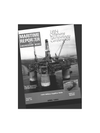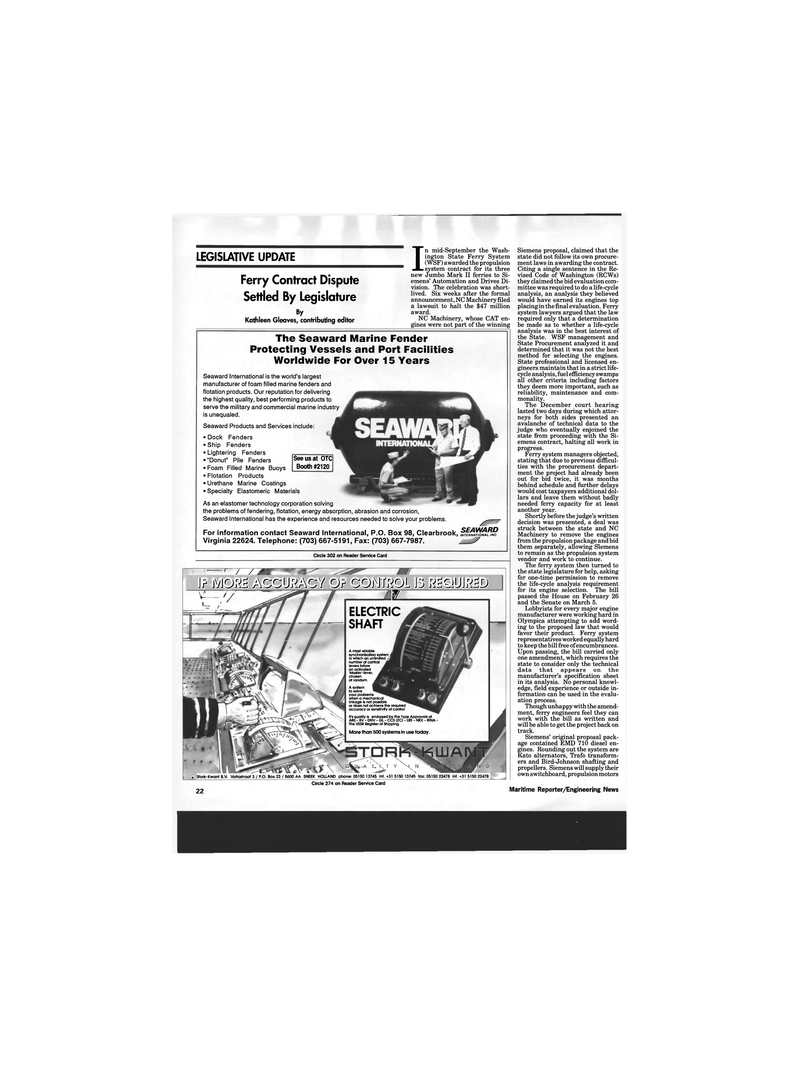
Page 20: of Maritime Reporter Magazine (April 1994)
Read this page in Pdf, Flash or Html5 edition of April 1994 Maritime Reporter Magazine
Seaward Products and Services include: • Dock Fenders • Ship Fenders • Lightering Fenders •"Donut" Pile Fenders • Foam Filled Marine Buoys • Flotation Products • Urethane Marine Coatings • Specialty Elastomeric Materials
See us at OTC
Booth #2120
Circle 302 on Reader Service Card
LEGISLATIVE UPDATE
Ferry Contract Dispute
Settled By Legislature
By
Kathleen Gleaves, contributing editor
In mid-September the Wash-ington State Ferry System (WSF) awarded the propulsion system contract for its three new Jumbo Mark II ferries to Si- emens' Automation and Drives Di- vision. The celebration was short- lived. Six weeks after the formal announcement, NC Machinery filed a lawsuit to halt the $47 million award.
NC Machinery, whose CAT en- gines were not part of the winning
The Seaward Marine Fender
Protecting Vessels and Port Facilities
Worldwide For Over 15 Years
Seaward international is the world's largest manufacturer of foam filled marine fenders and flotation products. Our reputation for delivering the highest quality, best performing products to serve the military and commercial marine industry is unequaled.
For information contact Seaward International, P.O. Box 98, Clearbrook, ^rf/^f^f^B
Virginia 22624. Telephone: (703) 667-5191, Fax: (703) 667-7987.
As an elastomer technology corporation solving the problems of fendering, flotation, energy absorption, abrasion and corrosion,
Seaward International has the experience and resources needed to solve your problems.
Circle 274 on Reader Service Card 7ZZ Jr MjHl ACCUliACY Or COMfflOL J5 flgaUJf^D
I
ELECTRIC
SHAFT
V V-
A most reliable synchronization system in which an unlimited ' number of control levers follow an activated 'Master'-lever, chosen at random.
A system to solve your problems when a mechanical linkage is not possible or does not achieve the required accuracy or sensitivity of control
It's quality is endorsed by the Type Approvals of
ABS - BV - DNV - GL - CCS (ZC) - LRS - NKK - RINA -
The USSR Register of Shipping.
More than 500 systems in use today. . Stork-Kwant B.V. Voltastraat 3 / P.O. Box 23 / 8600 AA SNEEK HOLLAND phone: 05150 13745 int. +31 5150 13745 fax: 05150 22478 int. +31 5150 22478
Siemens proposal, claimed that the state did not follow its own procure- ment laws in awarding the contract.
Citing a single sentence in the Re- vised Code of Washington (RCWs) they claimed the bid evaluation com- mittee was required to do a life-cycle analysis, an analysis they believed would have earned its engines top placing in the final evaluation. Ferry system lawyers argued that the law required only that a determination be made as to whether a life-cycle analysis was in the best interest of the State. WSF management and
State Procurement analyzed it and determined that it was not the best method for selecting the engines.
State professional and licensed en- gineers maintain that in a strict life- cycle analysis, fuel efficiency swamps all other criteria including factors they deem more important, such as reliability, maintenance and com- monality.
The December court hearing lasted two days during which attor- neys for both sides presented an avalanche of technical data to the judge who eventually enjoined the state from proceeding with the Si- emens contract, halting all work in progress.
Ferry system managers objected, stating that due to previous difficul- ties with the procurement depart- ment the project had already been out for bid twice, it was months behind schedule and further delays would cost taxpayers additional dol- lars and leave them without badly needed ferry capacity for at least another year.
Shortly before the judge's written decision was presented, a deal was struck between the state and NC
Machinery to remove the engines from the propulsion package and bid them separately, allowing Siemens to remain as the propulsion system vendor and work to continue.
The ferry system then turned to the state legislature for help, asking for one-time permission to remove the life-cycle analysis requirement for its engine selection. The bill passed the House on February 26 and the Senate on March 5.
Lobbyists for every major engine manufacturer were working hard in
Olympica attempting to add word- ing to the proposed law that would favor their product. Ferry system representatives worked equally hard to keep the bill free of encumbrances.
Upon passing, the bill carried only one amendment, which requires the state to consider only the technical data that appears on the manufacturer's specification sheet in its analysis. No personal knowl- edge, field experience or outside in- formation can be used in the evalu- ation process.
Though unhappy with the amend- ment, ferry engineers feel they can work with the bill as written and will be able to get the project back on track.
Siemens' original proposal pack- age contained EMD 710 diesel en- gines. Rounding out the system are
Kato alternators, Trafo transform- ers and Bird-Johnson shafting and propellers. Siemens will supply their own switchboard, propulsion motors 22 Circle 282 on Reader Service Card Maritime Reporter/Engineering News

 19
19

 21
21
